In a surprise announcement, the NCAA investigation on the University of North Carolina (“UNC”) academic scandal regarding the African-American Studies department that has gone on for the past several years is now over. The NCAA did not levy any penalties against UNC for their alleged infractions of NCAA rules. The Committee on Infractions (COI) could not conclude that NCAA violations occurred as a result of widespread and allegedly fraudulent “paper classes.” Taking everything into account, while there were obviously issues within the department, they did not rise to the level of, or at least there wasn’t enough evidence to rise to the level of, NCAA violations of academic fraud. The ruling that came down today is more of a procedural and jurisdictional result as opposed to a factual result.
NCAA Authority over Academics
As the Sports Esquires previously analyzed, under the old rules, the NCAA would not regulate academics absent certain circumstances. First and foremost, a school had to self-report an issue to the NCAA; the NCAA didn’t monitor schools to look at classrooms, transcripts and tests to see if something was amiss. Only once a school self-reported an issue, would the NCAA investigate. School staff members had to be involved, and eligibility had to be affected. The only way academic fraud became an NCAA issue is if it was tied into extra benefits; “okay, did this student-athlete get something that other students didn’t? For example, a student-athlete who was referred to a paper class by a staff member to a paper class, and got an “A” that brought their GPA up to what it needed to be to compete, is an NCAA issue. An already academically eligible student-athlete in the same class that was not referred to the class by a staff member, was not an NCAA issue.
This case was particularly complex, especially with regards to the multiple Notices of Allegations (NOA) that the NCAA sent. First, there were men’s basketball, women’s basketball, and football student-athletes mentioned in emails. Then, two sports were removed and only women’s basketball remained in the first Amended NOA. The COI was ultimately unable to determine a violation occurred because, despite the irregularities, it was inconclusive that the aid given by staff members to student-athletes was as a result of their athletic participation. Additionally, the fact that much of the evidence was over seven years old and data/evidence was incomplete, did not help to support a finding of violations. Perhaps some impermissible assistance was given, but the COI could not find that it affected eligibility with the information provided. As a result, from the NCAA’s point of view, this is a school issue. While UNC initially identified the subject of this investigation as academic fraud, the school later recanted and categorized the irregularities as just garden variety academic irregularities not related to athletics.[i] Because of this, under the applicable NCAA rules at the time, the scope of the COI’s and the NCAA’s authority in this matter was limited.
At the heart of the matter were courses taken by approximately 3000 students on campus, with around half being student-athletes (Greek life was apparently heavily involved in this population). Word about easy classes spreads like wildfire on college campuses, and word of mouth was just as good before Rate My Professor existed. The evidence in the NOAs did not include institutional staff members getting 1500 student-athletes into the classes; the majority seemed to have found out themselves. A student-athlete finding an easy or even fake class on their own, without aid from the school or without admission to the class based on athletics participation is not a violation of NCAA rules. The fact that there were 1500 regular students in the allegedly fraudulent courses, lends credence to the finding that this was not an NCAA rules violation of extra benefits legislation.
Without a clear connection to athletics eligibility, and without a UNC decision that academic fraud (now misconduct) occurred, the NCAA didn’t have the authority to police these academic cases. With the amount of other students in the courses, showing an extra benefit to student-athletes is difficult to prove. The COI even (seemingly begrudgingly) agrees that as the classes weren’t “systematically created or abused to serve solely athletics interests and the information presented did not squarely refute that point,” there can’t be a charge of lack of institutional control (or other NCAA violation) of the athletics program.
New Academic Misconduct Rules
Any UNC violations or allegations of NCAA wrongdoing were subject to the NCAA rules at the time of the alleged violations. However, the NCAA updated its rules during the course of its investigation. Effective August 1, 2016, the membership (the schools), new academic misconduct rules went into play that allow the NCAA more discretion and authority in policing these instances. The rationale of this proposal states:
“Despite changes in the academic landscape, academic misconduct legislation has not been revised since 1983 when the legislation was added to the Manual. Under the current regulatory structure, it can be unclear when academic misconduct involving student-athletes falls within the purview of the NCAA and when academic misconduct should be an institutional matter. This proposal will address membership concerns by expanding the application of academic misconduct legislation to any situation in which an institutional staff member is involved and replacing the current academic extra benefit analysis with a specific and limited definition of impermissible academic assistance.”
Under this new framework, even if the NCAA cannot prove a change in eligibility, an academic misconduct violation can occur under 18 instances of assistance from an academic counselor. Under the previous rules, the COI essentially punted on this issue most of all, saying that incomplete information and without looking at the work itself, a finding of academic fraud wasn’t possible.[ii]
Under the new legislation of NCAA Bylaw 14.9 (Post-Enrollment Academic Misconduct), the UNC investigation and COI likely has a very different outcome. Under the new analysis, staff involvement alone, regardless of how many regular students were involved or a change in eligibility would rise to the level of NCAA violation now.
Great Result for the Tar Heels
This really could not have turned out better for UNC. Under the previous rules, the NCAA scope and authority was somewhat limited on fully investigating/punishing academic fraud, and could only be applied in specific instances, that apparently weren’t met here (again, staff member involvement: CHECK; affecting eligibility: apparently not proven). The two violations that were found are only on the two staff members for not cooperating in the investigation, and don’t fall within academic misconduct, don’t fall on a particular sport, and don’t even fall on the school.
Even with the new rules in place, academic misconduct still falls on the institution to find first before the NCAA will get involved. Such a determination is not based on NCAA legislation, but each school’s policies and procedures. This case will not be good precedent for anyone under the new rules, and should not affect future cases of academic misconduct. At the end of today, UNC comes out squeaky clean (well mostly, aside from academic reputation moderately tarnished, and the probation on their accreditation), while the NCAA appears ineffective in the eyes of the masses. Despite this view, this is not a failure to punish on behalf of the NCAA, this is a lack of available authority and jurisdiction given the facts and evidence presented, which won’t (read: shouldn’t) happen again thanks to the new rules in place as of last year.
[i] “A singular principle allowed UNC room to make its claims and, ultimately, limits the panel’s ability to conclude that academic fraud occurred. Since 2014, the NCAA membership has acknowledged the question whether academic fraud occurred is one appropriately answered by institutions based on their own academic policies. The membership trusts academic entities to hold themselves accountable and report academic fraud to the NCAA and has chosen to constrain who decides what constitutes academic fraud. Because of this limitation, UNC’s decision to support the courses as legitimate combined with a stale and incomplete record that does not allow the panel to drill down to the course and assignment level—even if the panel had wanted to second guess the courses—it cannot conclude academic fraud occurred. Similarly, the panel cannot conclude that extra benefit violations occurred surrounding the offering or managing of the courses as alleged. The courses were generally available to the student body, and non-student-athletes took the courses. Further, the record does not include specific and identifiable examples of benefits at the student-athlete level not generally available to the student body. Based on the general availability and the lack of specific examples, the panel cannot conclude a systemic effort to impermissibly benefit student-athletes.”
[ii] Seems like there are still potentially way to tie these 18 instances into an erroneous declaration of eligibility, but without seeing exactly what they had as evidence, hard to say for certain.
 The Sports Esquires Putting Sports on Trial
The Sports Esquires Putting Sports on Trial
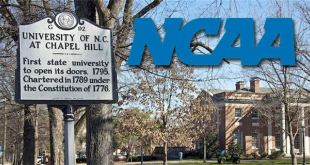

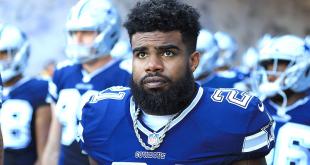
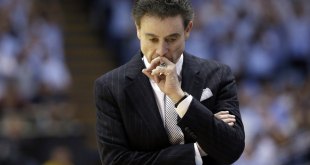
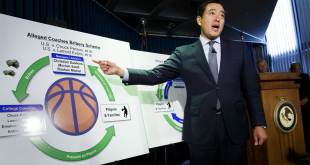
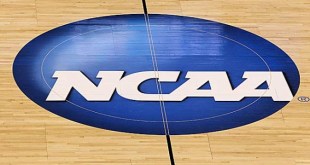
One comment
Pingback: Sports Law Links - The Sports Esquires